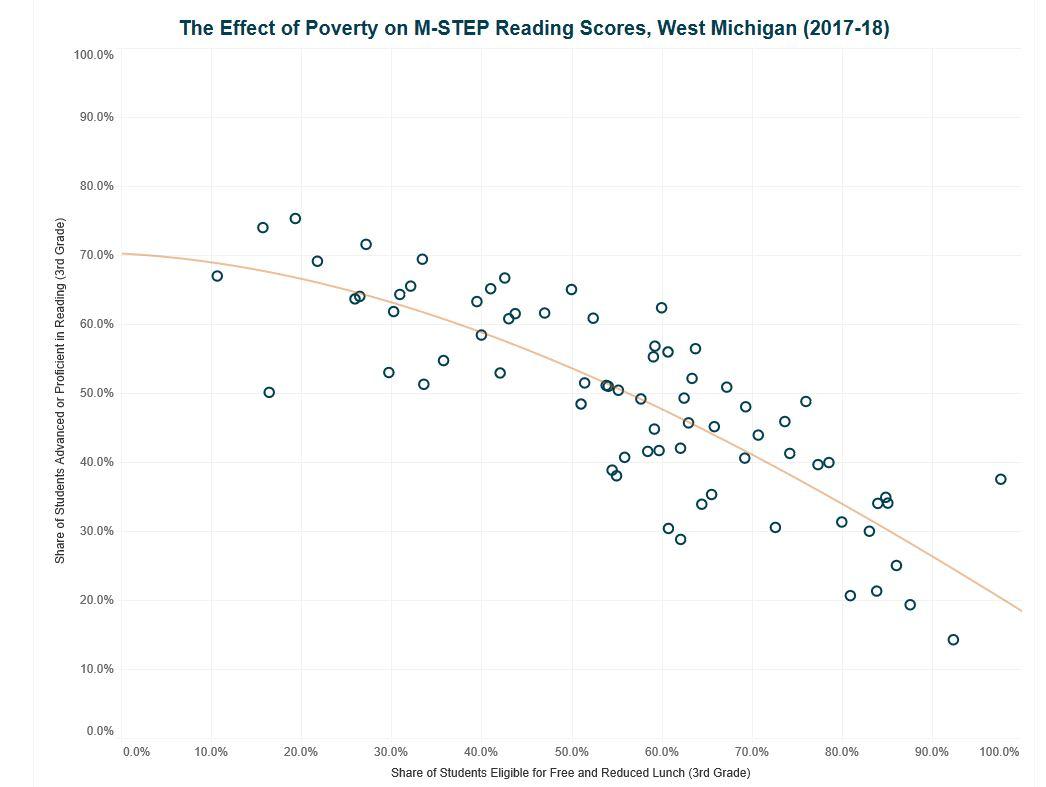Talent 2025 advocates for improvement to K-12 education in West Michigan, and early literacy is imperative to that cause. To prepare West Michigan students for the workforce, Talent 2025 recognizes the importance of supporting education and literacy at the earliest stages. We all know that reading is essential, and studies show that it is especially important for young K-12 students. In fact, kids who can read by third grade are more likely to be college and career ready by the time they graduate high school. If they are not, research also shows that their chances of becoming proficient later are minimal.
Unfortunately, Michigan’s young students are falling behind, with reading proficiency rates steadily declining as other states improve. In October of 2016, a law was passed stating that third-graders must be reading proficient in order to advance to the fourth grade — and while proficiency is critical, many schools struggle to help their students reach this goal. A supposition supported by the MSTEP third-grade reading proficiency scores that were released last month for the 2017-18 academic year. When taking the reading proficiency rate for a school district in combination with their proportion of economically disadvantaged students, a startling trend emerges that could impact youth across West Michigan.
Reading Proficiency and Poverty
The MSTEP assessment, taken by third-graders across Michigan’s 83 counties, is intended to estimate the number of students within a school that are either advanced, proficient, partially proficient, or not proficient in a particular subject matter — ranging from English Language Arts to Mathematics. The proficiency scores illustrated in the figure below portray the proportion of all third-graders, within a specific school district located in West Michigan, who scored either advanced or proficient on the reading component of the MSTEP assessment. Thus, these are students who have either met or exceeded the reading proficiency requirements necessary to advance into the fourth grade.

Click here to see more detailed information contained within this graph.
According to the figure above, there appears to be a negative correlation between the share of students in a school district who scored advanced or proficient on the MSTEP reading assessment and a school’s share of economically disadvantaged students (defined as those who are eligible for free and reduced lunch). For example, Hudsonville Public Schools boasted the highest proportion of third-graders who scored advanced or proficient in reading when compared to the other school districts across West Michigan — with 75.3 percent of third graders meeting or exceeding their proficiency expectations. Yet, in terms of the share of third-grade students who are eligible for free and reduced lunch, this apex reading proficiency school district ranks the fourth lowest in West Michigan, at 19.4 percent. Conversely, the school district with the second highest share of economically disadvantaged third-grade students — the Public Schools of the City of Muskegon, with 92.4 percent of third graders categorized as economically disadvantaged — also experienced the lowest reading proficiency score of any other school district in West Michigan, at 14.2 percent.
Future Data Topics
Have you been enjoying these “Data Points” blogs? Are you interested in other data? Let us know what topics you’d like to know more about on our Twitter @WMTalent2025! We’d like to crunch some numbers that you’re interested in.


